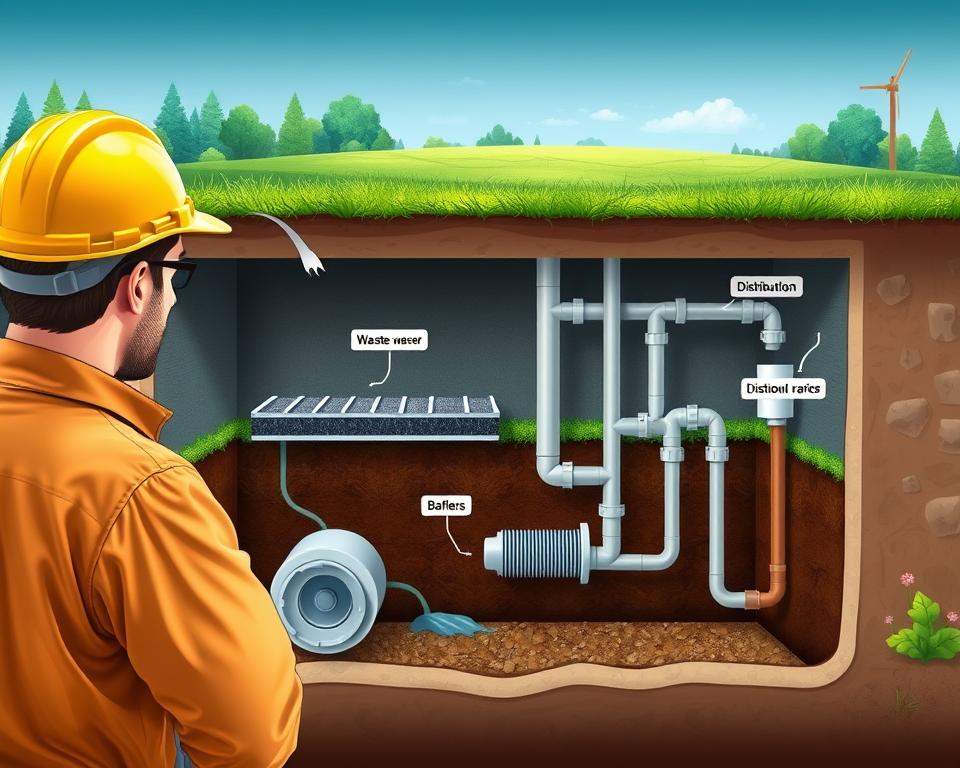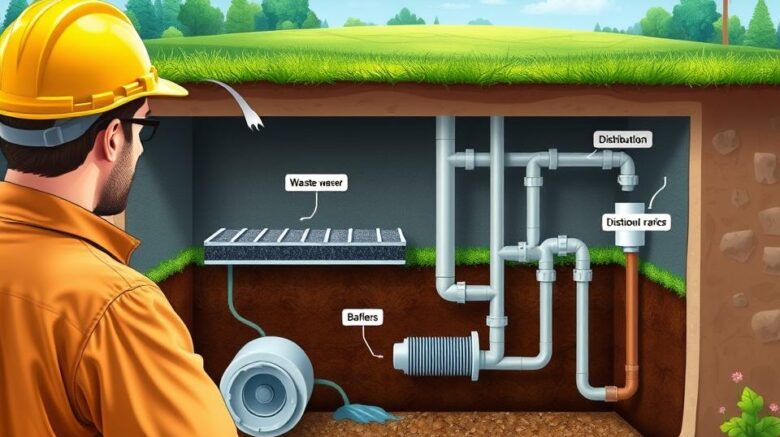Septic System Cleaning
Do you ever wondered concerning the consequences of overlooking septic system care? For those who use these systems for waste management, skipping regular care can cause hefty costs. It also introduces hazards to both public safety and the environment. Servicing your septic system is far from a basic task; it’s vital for making sure your household operates reliably. By routinely clearing out your septic tank, you stop solid waste accumulation and lengthen the longevity of your unit. This forward‑looking strategy lets you avoid any undesirable scenarios. Discover the significance of septic tank maintenance and the methods involved with septic inspection.
Essential Insights
- Routine septic system cleaning is vital for warding off hefty fixes.
- Overlooking upkeep can lead to health risks for your loved ones.
- Understanding your septic system assists in proper stewardship.
- Symptoms of a malfunctioning septic system should be recognized quickly.
- Expert contractors can support in preserving peak tank health.
Comprehending Your Septic System
A septic system is an economical onsite approach for processing wastewater. It mainly includes two sections: the septic tank and the drainfield. Both are vital for providing safe treatment and preserving the surroundings.
The septic tank gathers wastewater from your home. In it, solids drop to the base, and effluent rise to the upper layer. Naturally occurring bacteria within the tank break down the biomatter, making the effluent easier to process. This pre‑treated wastewater then flows to the absorption area for additional filtering by the earth, finishing the treatment.
It’s important for homeowners to appreciate the dynamics of their septic system. Learning how the septic tank and field function as a unit can result in enhanced system care. This insight promotes effective maintenance practices, ensuring the system’s durability.

Importance of Routine Septic System Cleaning
Consistent servicing of the septic system is essential for household and public health. If neglected, raw wastewater can leak into your yard. This overflow may result in groundwater contamination, posing health risks. By keeping the septic system clean, you protect your loved ones and the community.
It’s advised to clean the septic system every 3‑5 years, based on how much you load it. Such care is not just good for the planet; it heads off big bills. A septic system that’s properly cared for operates more reliably, ensuring a cleaner home environment and a safer environment.
Warnings Your Septic Tank Needs Service
Homeowners need to spot clues that their septic tank may need pumping. Primary indicators to monitor consist of:
- Slow water flow in basins, bathtubs, and loos
- Unpleasant smells near the drainfield
- Wastewater backups in household plumbing
- Persistent wet areas or overly green sections of grass above the septic system
It’s critical to spot these signs early to avert serious septic tank failures. Routine inspections are essential. They help spot issues before they escalate to pricey fixes. Inspecting your system regularly ensures it functions well and lasts longer.
Staying alert and acting swiftly are crucial for septic system care. By paying close attention to these red flags, you can maintain your septic system in optimal health.
Septic System Cleaning Intervals
Cleaning your septic system consistently is central to ensuring your home’s plumbing in excellent condition. Professionals typically recommend pumping the septic tank every three‑to‑five years. However, this can change based on the size of your family, how much water you use, and the size of your tank.
If you have a high‑occupancy household that draws more water, you might need to service the system more often. Watching your water consumption can let you determine if you need to revise your pumping schedule.
All in Sanitation advises setting up a steady pumping schedule that matches your household’s specific needs. Following a set maintenance plan maintains your septic system operating effectively and sidesteps costly restorations.
Septic System Cleaning: Recommended Methods
For a septic system to remain sound, homeowners must practice crucial habits. It’s critical not to flush non‑biodegradable items; doing so stops obstructions and maintains the system working well. Similarly, limiting harsh chemicals keeps the required bacterial population. These measures are critical for the system’s life span and efficiency.
Proactivity with routine inspections is essential. Scheduling periodic inspections can detect issues quickly, enabling prompt fixes. Additionally, conserving water through repairing drips and mindful usage aids septic tank health. These practices guarantee the system functions effectively for a long time.
It’s also wise not to place heavy loads on the absorption area. Keeping this area unobstructed lets it properly manage effluent, shielding your system from harm. Heeding advice from experts like All in Sanitation also boosts septic system care.
The Procedure of Septic Tank Pumping
For homeowners, grasping the septic system cleaning process is key. A licensed septic pumper should conduct scheduled septic tank pumping to maintain your system operating properly. The first step is checking the tank’s state to determine when it needs pumping.
A septic tank demands pumping once the solid layer fill about a third to 50 percent of its space. The licensed septic pumper will then clear out these accumulations. This action keeps the system’s efficiency. Furthermore, the visit may involve inspecting the tank for possible issues, enabling quick fixes.
Maintaining a log of each pumping visit is wise. This log enables you to keep tabs on their septic system’s service history, and is useful if selling the property. Proper septic system maintenance improves its service life and reliability, averting expensive fixes in the future.
Septic Tank Inspection: What to Watch For
Scheduled inspections are essential for your septic system’s health. Using a comprehensive septic tank inspection checklist can uncover possible issues before they worsen. Inspections should be done by a licensed contractor every 1‑2 years. They will measure sludge buildup and the scum layer’s condition during this visit.
Examining the inlet and outlet baffles and effluent filters is also important. These parts are essential for your septic system’s smooth operation. Finding seepage or malfunctions quickly can sidestep steep repair costs. Preventive actions, like using an inspection checklist, enhance your system’s longevity and performance.
Specialized Septic System Services
Engaging specialized septic system services is vital for your septic system’s efficiency. By selecting a company like All in Sanitation, you ensure that experts handle the cleaning, check‑ups, and repairs carefully. Certified experts possess expertise, helping homeowners to keep the system’s peak functionality long‑term.
Maintenance by certified technicians lowers the risk of sudden breakdowns and expensive fixes. These services feature comprehensive inspections that assess the system’s status, locating possible problems early. Maintaining this proactive stance significantly extends your septic system’s longevity.
Ultimately, delegating your septic system to qualified experts offers confidence. Working alongside companies such as All in Sanitation taps into their know‑how. It guarantees the integrity of your tank, building confidence in its maintenance.
Septic System Maintenance Hints for Homeowners
Homeowners have the ability to ensure their septic systems functioning smoothly. Following efficient care hints markedly enhances their performance. Implementing simple tweaks to how we use water, like cutting down on unnecessary use and spreading the use of appliances, decreases load on the system.
Fitting efficient fixtures in your bathrooms and galleys noticeably supports septic durability. These fixtures lower water use without hurting convenience. Not using garbage disposals is smart too, as they produce more waste in the system, necessitating extra upkeep.
Consistent inspections and adhering to a proper maintenance routine will prolong your septic system’s life. Being mindful of everything that flows into your drains is essential for keeping a robust septic environment. By practicing these measures, you’ll significantly support your septic system’s performance and longevity.
Common Septic System Repairs
Septic systems may experience various issues over time, requiring repairs. Typical problems include fluid loss, broken baffles, and drainage issues in the absorption area. By spotting the signs promptly, homeowners can resolve them rapidly, maintaining their system stays in solid condition.
Usual repairs involve:
- Swapping faulty components to bring back system integrity
- Mending or replacing damaged pipes to stop leaks
- Removing obstructions from plugged lines to maintain proper drainage
Handling septic problems swiftly not only lowers costs over time but also prolongs the system’s lifespan. Routine check‑ups and maintenance can help prevent these issues, aiding in the care of a healthy septic system.
To Summarize
Preserving your septic system sound is critical to planetary and family well‑being. Regular pumpings and examinations prevent costly fixes and health risks. Taking initiative with septic care conserves resources and lowers stress.
Using experts like All in Sanitation delivers top‑notch upkeep adapted to your system. Their knowledge aids catch issues early, avoiding major troubles and underscoring the need for scheduled inspections.
Practicing sound methods for septic maintenance promises long‑term system efficiency. A small amount of maintenance in the present secures a healthier septic system in the future.
